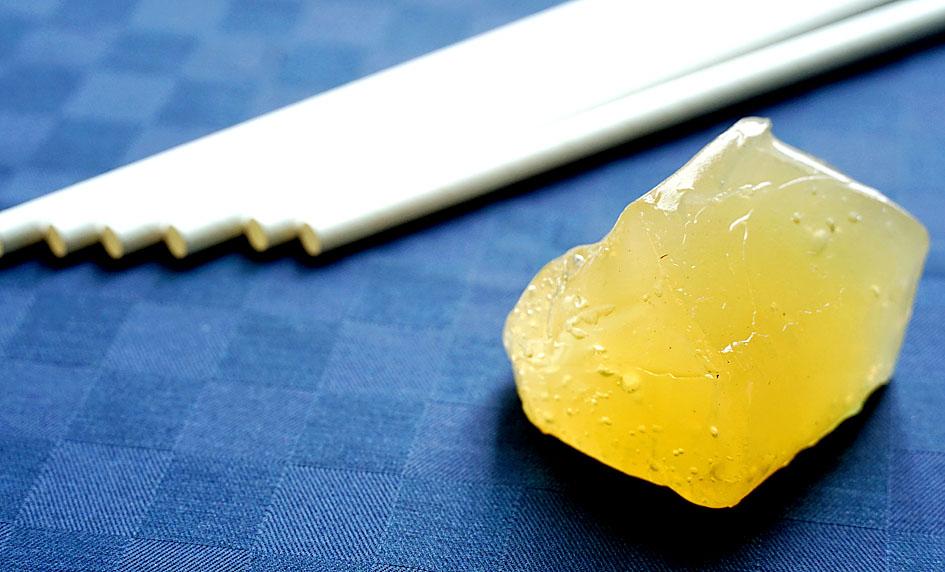The Industrial Technology Research Institute (ITRI, 工業技術研究院) yesterday said it has developed a new environmentally friendly hot-melt adhesive in conjunction with Tex Year Industries Inc (德淵企業).
The new biodegradable adhesive could be a vital component of future biodegradable plastic products, helping to reduce the environmental impact of plastics, the institute said.
The biodegradable adhesive, which has already received its product license, is planned to be turned into a commercial product by Tex Year, the largest maker of hot-melt adhesives in Taiwan, the institute said.

Photo courtesy of Industrial Technology Research Institute
The product should help Taiwanese plastic products go green, as required by an increasing number of large international companies, it added.
The institute’s polymer division and Tex Year began working together last year on the hot-melt adhesive using biodegradable plastic as the base ingredient rather than traditional petrochemical plastic.
The institute said the technical knowledge would be transferred to Tex Year for commercial utilization. The polymer division plans to work on other projects such as decomposing ocean plastic debris and creating other advancements in plastics, it added.
“The ITRI is actively helping Taiwanese industry develop a green supply chain and aid in Taiwan’s green industrial transformation,” said Lee Tzong-ming (李宗銘), deputy director-general of the Material and Chemical Research Laboratories at the ITRI.
In addition to being bio-degradable, the new glue’s special molecular structure design gives it excellent qualities as a hot-melt adhesive, Lee said. It melts at the 80°C, and “has excellent adhesive and durable properties,” he said.
Tex Year chairman Donald Hsiao (蕭向志) said the new adhesive can help clients who need to conform to new EU carbon tax regulations.
“We are the first company in Asia to receive certification from the German Institute for Standardization, and will soon receive our biodegradable and compostable certifications,” Hsiao said.

Taiwan Semiconductor Manufacturing Co (TSMC, 台積電) secured a record 70.2 percent share of the global foundry business in the second quarter, up from 67.6 percent the previous quarter, and continued widening its lead over second-placed Samsung Electronics Co, TrendForce Corp (集邦科技) said on Monday. TSMC posted US$30.24 billion in sales in the April-to-June period, up 18.5 percent from the previous quarter, driven by major smartphone customers entering their ramp-up cycle and robust demand for artificial intelligence chips, laptops and PCs, which boosted wafer shipments and average selling prices, TrendForce said in a report. Samsung’s sales also grew in the second quarter, up

On Tuesday, US President Donald Trump weighed in on a pressing national issue: The rebranding of a restaurant chain. Last week, Cracker Barrel, a Tennessee company whose nationwide locations lean heavily on a cozy, old-timey aesthetic — “rocking chairs on the porch, a warm fire in the hearth, peg games on the table” — announced it was updating its logo. Uncle Herschel, the man who once appeared next to the letters with a barrel, was gone. It sparked ire on the right, with Donald Trump Jr leading a charge against the rebranding: “WTF is wrong with Cracker Barrel?!” Later, Trump Sr weighed

HEADWINDS: Upfront investment is unavoidable in the merger, but cost savings would materialize over time, TS Financial Holding Co president Welch Lin said TS Financial Holding Co (台新新光金控) said it would take about two years before the benefits of its merger with Shin Kong Financial Holding Co (新光金控) become evident, as the group prioritizes the consolidation of its major subsidiaries. “The group’s priority is to complete the consolidation of different subsidiaries,” Welch Lin (林維俊), president of the nation’s fourth-largest financial conglomerate by assets, told reporters during its first earnings briefing since the merger took effect on July 24. The asset management units are scheduled to merge in November, followed by life insurance in January next year and securities operations in April, Lin said. Banking integration,

LOOPHOLES: The move is to end a break that was aiding foreign producers without any similar benefit for US manufacturers, the US Department of Commerce said US President Donald Trump’s administration would make it harder for Samsung Electronics Co and SK Hynix Inc to ship critical equipment to their chipmaking operations in China, dealing a potential blow to the companies’ production in the world’s largest semiconductor market. The US Department of Commerce in a notice published on Friday said that it was revoking waivers for Samsung and SK Hynix to use US technologies in their Chinese operations. The companies had been operating in China under regulations that allow them to import chipmaking equipment without applying for a new license each time. The move would revise what is known